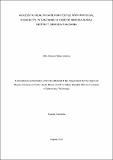| dc.description.abstract | This cross-sectional study explored the availability and affordability of healthcare services
for people with a physical disability (PWPDs). Also, it determined whether the existing
infrastructure at health facilities in Singida rural district supports PWPDs. The study applied
mixed-method approaches involving quantitative and qualitative surveys with 15 key
informants and 90 participants PWPDs from 18 wards and all 32 health facilities found in the
district. To avoid the chance of the respondent‟s response being influenced by their parents
and to make the respondents feel free to talk about whatever is in their mind about access to
healthcare for PWPDs, the researcher selected 5 respondents in each ward aged 18 and above
who could express themselves without being represented. The study used simple random,
purposive, and snowballing sampling techniques to yield 90 respondents, 15 key informants,
and 32 health facilities. Participants with physical disabilities were determined using the
Washington Group on Disability statistics questions set to provide basic information on
disability comparable worldwide. Data were collected using a questionnaire survey,
interview, and observation. The researcher employed SPSS-26 software to analyze
quantitative data and NVivo-12 software to analyze qualitative data. The analysis was
conducted to obtain frequencies and percentages. Data presented in figures and tables; A
thematic analysis was applied to determine certain variables such as age, gender,
infrastructure, and access to healthcare services. The Chi-square test was employed to test the
relationship between categorical variables. The study found that in Singida rural district, there
were no special health facilities and specialist nurses/ doctors for PWPDs. Most of them still
experience delays in getting an appointment and other services from nurses, primary care
doctors, specialists, treatment interventions, and medical equipment. Similarly, the available
healthcare service is not affordable to PWPDs, and most of them were not beneficiaries of
health insurance schemes hence depending on the out-of-pocket payment system.
Furthermore, the infrastructures at health facilities do not favor PWPDs. Therefore, the
findings indicate that access to healthcare for PWPDs in Singida rural district is not available
and affordable for PWPDs. Also, the existing infrastructure at health facilities doesn't support
PWPDs to access healthcare. The study suggests that the government and other healthcare
stakeholders should consider access to healthcare for PWPDs in rural areas where most
PWPDs are at risk. | en_US |

